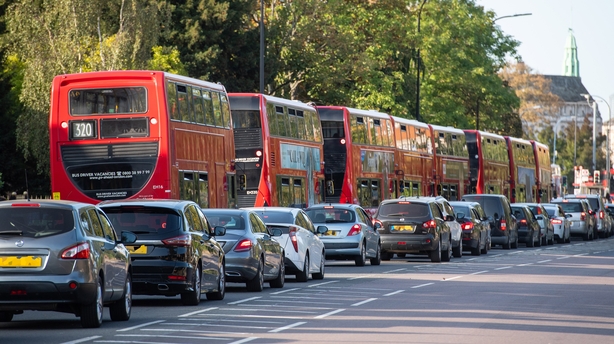Senior UK health officials contacted their Irish counterparts this week seeking help with Covid-19 tests.
The UK is facing problems with their government's Covid-19 test and trace programme, with people being forced to travel hundreds of miles to get a test.
HSE CEO Paul Reid said he was contacted by officials from the NHS earlier this week to help plug a hole in their system.
Mr Reid was defending Ireland's testing capacity following a surge in demand for Covid-19 tests in recent weeks.
He said: "What's happening with their (UK) testing and tracing system, which is in almost collapse and the shutting down of swabbing centres.
"Earlier this week, I was contacted by some very senior officials in the NHS seeking could the Irish health service do some testing in laboratories for themselves.
"What we did in the quieter period in the summer was build up our capacity for 100,000 tests (per week).
"We were not in a position (to help). We built up our capacity purely for Ireland. It was an informal contact but it demonstrates where other systems are at."
England has been struggling with its testing capacity, as new figures showed only a third of people who turned up for a coronavirus test there got results within 24 hours.
But the head of the system denied it was "failing" and a senior minister hit out at people for "carping" about its flaws.
As pressure continued to mount on the Government over the chaos in the testing system, Dido Harding - head of NHS Test and Trace - acknowledged that demand was significantly outstripping capacity.
But she suggested that the size of the system had been based on modelling by the Government's scientific advisers, and suggested the problems were exacerbated by people without symptoms seeking tests for which they were ineligible.
Faced with criticism of the shortage of tests, Commons Leader Jacob Rees-Mogg told MPs that "instead of this endless carping", people should "celebrate the phenomenal success of the British nation in getting up to a quarter of a million tests of a disease that nobody knew about until earlier in the year".

Meanwhile, in the latest sign that stricter measures may be required to control the spread of the virus, around two million people in the north east of England will be banned from socialising with other households, following a "concerning" rise in Covid-19 cases.
New testing figures for England showed 33.3% of people who were swabbed at a regional site, local site or mobile testing unit received their result within 24 hours - despite Boris Johnson's promise that they would all be turned around within that timescale by the end of June.
Some 73.9% of close contacts of people who tested positive for Covid-19 in England were reached through the Test and Trace system in the week ending 9 September.
This figure is up from 69.5% on the previous week, but below the 77.2% reached in the week to 19 August.
Ms Harding told MPs "demand is significantly outstripping the capacity we have" to conduct coronavirus tests, but "I strongly refute that the system is failing".
The number of people calling 119 or visiting the website to try to book tests was "three to four times the number of tests that we currently have available" - although that would involve some double counting.
But she said the number of symptomatic people - the only people who should be eligible for diagnostic tests - was "significantly lower" than the number trying to get a swab.
She suggested around a quarter of those coming forward for a test did not have symptoms.
Ms Harding said the system's capacity was based on modelling by the Government's scientific advisory panel Sage.
In anticipation of the return of schools, "we planned for a sizeable increase in testing capacity", she said, but "plainly we don't have enough testing capacity today and we are doing everything in our power to increase the testing capacity".
The latest figure showed an ability to carry out 242,817 tests a day, but the British government has pledged that will increase to 500,000 by the end of October.
Tests are being prioritised, with around 50% accounted for by NHS patients and staff and social care.
Ms Harding said more tests were also targeted in outbreak areas and then, among the wider population, key workers - especially teachers - could be given priority.
Figures today showed there had been a further 3,395 lab-confirmed cases of coronavirus in the UK, and 21 more people had died within 28 days of testing positive.
This brings the UK death toll to 41,705, although separate figures published by the statistics agencies show 57,500 cases where Covid-19 was mentioned on a death certificate.
The new restrictions in the north east will come into effect tomorrow in Northumberland, North Tyneside, South Tyneside, Newcastle-upon-Tyne, Gateshead, Sunderland and County Durham.
Residents will be banned from socialising in homes or gardens with people outside their own households or support bubble, food and drink venues will be restricted to table service only and leisure and entertainment venues must also close at 10pm.
The changes run alongside the England-wide six person limit on social gatherings.

